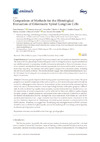Please use this identifier to cite or link to this item:
https://accedacris.ulpgc.es/jspui/handle/10553/75331
| Title: | Comparison of methods for the histological evaluation of odontocete spiral ganglion cells | Authors: | Ramírez Herrera, Tania Aurora Sacchini, Simona Paz Sanchez, Yania Rosales Santana, Rubén Sebastián Câmara, Nakita Andrada Borzollino, Marisa Ana Arbelo Hernández, Manuel Antonio Fernández Rodríguez, Antonio Jesús |
UNESCO Clasification: | 240119 Zoología marina 310907 Patología 240110 Histología animal |
Keywords: | Cetaceans Decalcification Ear Histology Spiral Ganglion |
Issue Date: | 2020 | Journal: | Animals | Abstract: | Cetaceans greatly depend on their hearing system to perform many vital activities. The spiral ganglion is an essential component of the auditory pathway and can even be associated with injuries caused by anthropogenic noise. However, its anatomical location, characterized by surrounding bony structures, makes the anatomical and anatomopathological study of the spiral ganglion a difficult task. In order to obtain high-quality tissue samples, a perfect balance between decalcification and the preservation of neural components must be achieved. In this study, different methodologies for spiral ganglion sample preparation and preservation were evaluated. Hydrochloric acid had the shortest decalcification time but damaged the tissue extensively. Both formic acid and EDTA decalcification solutions had a longer decalcification time but exhibited better preservation of the neurons. However, improved cell morphology and staining were observed on ears pretreated with EDTA solution. Therefore, we suggest that decalcifying methodologies based on EDTA solutions should be used to obtain the highest quality samples for studying cell morphology and antigenicity in cetacean spiral ganglion neurons. | URI: | https://accedacris.ulpgc.es/handle/10553/75331 | ISSN: | 2076-2615 | DOI: | 10.3390/ani10040683 | Source: | Animals [EISSN 2076-2615], v. 10 (4), 683, (Abril 2020) |
| Appears in Collections: | Artículos |
SCOPUSTM
Citations
13
checked on Jun 8, 2025
WEB OF SCIENCETM
Citations
11
checked on Feb 15, 2026
Page view(s) 5
416
checked on Oct 25, 2025
Download(s)
648
checked on Oct 25, 2025
Google ScholarTM
Check
Altmetric
Share
Export metadata
Items in accedaCRIS are protected by copyright, with all rights reserved, unless otherwise indicated.
